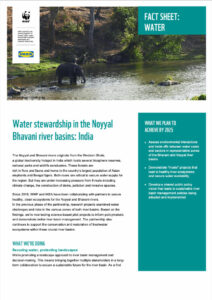Water stewardship in the Noyyal Bhavani river basins: India
The Noyyal and Bhavani rivers originate from the Western Ghats, a global biodiversity hotspot in India which hosts several biosphere reserves, national parks and wildlife sanctuaries. These forests are rich in flora and fauna and home to the country’s largest population of Asian elephants and Bengal tigers. Both rivers are critical to secure water supply for the region. But they are under increasing pressure from threats including climate change, the construction of dams, pollution and invasive species.
Since 2018, WWF and IKEA have been collaborating with partners to secure healthy, clean ecosystems for the Noyyal and Bhavani rivers.
In the previous phase of the partnership, research projects examined water challenges and risks in the various zones of both river basins. Based on the findings, we’re now testing science-based pilot projects to inform policymakers and demonstrate better river basin management. The partnership also continues to support the conservation and restoration of freshwater ecosystems within these crucial river basins.
What we plan to achieve by 2025
- Assess environmental interactions and trade-offs between water users and sectors in representative zones of the Bhavani and Noyyal river basins
- Demonstrate “model” projects that lead to healthy river ecosystems and secure water availability
- Develop a shared public policy vision that leads to sustainable river basin management policies being adopted and implemented
What we’re doing
Securing water, protecting landscapes
We’re promoting a landscape approach to river basin management and decision-making. This means bringing together multiple stakeholders in a long- term collaboration to secure a sustainable future for the river basin. As a first step, we’ve mapped out water resources and water needs within the basins, and developed possible future water scenarios. These will help us and our partners to create an integrated management plan to ensure there’s enough clean water available for people and nature.
Preliminary research indicates that invasive species put more pressure on both rivers and groundwater compared to native grassland, while climate change is increasingly disrupting the entire water balance. In close collaboration with the government forest department, local communities and regional NGOs, we’re creating a management plan for the upstream regions to address these and other issues. Through our participation in an ecological monitoring committee within the Madras High Court, we advocate for better management of invasive species and forested catchments, which are important sources of water for the human population and aquatic ecosystems.
Another major challenge is the presence of several hydropower dams in the Moyar River. These have serious impacts on aquatic ecosystems and fisheries in the region, so we’re developing a sustainable hydropower policy for these rivers. We’re also working with district wetland management committees and local communities to secure the long-term conservation of four wetlands covering an area of 285 hectares.
Promoting sustainable business
The Noyyal basin, particularly the cities of Tiruppur and Coimbatore, is a major textile hub, responsible for 90% of India’s cotton textile exports. Around 29,000 factories are involved in the various stages of textile production in the region, and the textile and garment industry is crucial to the economy and people’s livelihoods.
We’re engaging textile factories to become water stewards, consuming water in a way that is environmentally sustainable, socially equitable and economically beneficial. So far, we’ve conducted audits in more than 40 textile factories, and developed plans to improve their use of energy, water, chemicals and materials. Additionally, the partnership helps textile businesses to access financial support, including through credit schemes for installing clean technologies, and by developing bankable nature solutions – financially viable projects that support the development of more climate-resilient and sustainable landscapes and economies.
Promoting sustainable and regenerative agriculture
Intensive water use for agriculture is seriously affecting the Bhavani basin. Under the WWF and IKEA partnership, we’re supporting communities to adopt sustainable agricultural management practices and making sure these are widely disseminated. This ranges from improving crop and irrigation patterns to introducing innovative technologies and engaging local communities in watershed management activities. We also support local water conservation systems – including through public awareness campaigns on avoiding overexploitation of groundwater resources, and monitoring changes in groundwater levels.
Strengthening policy
WWF and IKEA work together to strengthen policies and governance structures at both state and national level. By demonstrating the positive impacts of science-based actions, we want to improve governmental landscape planning. At the same time, we are constantly monitoring the effectiveness of various policies and laws that manage these catchments to see how and where improvements are needed. We are working to develop policies for the large-scale removal of invasive species and restoration of natural grasslands, and to avoid damaging environmental impacts from hydropower operations in the Moyar and Bhavani rivers.
As part of our advocacy work in the textile sector, we directly engage with the Central Pollution Control Board to help develop regulatory standards and ensure their national implementation. We’re also supporting a joint vision for a sustainable textile sector in India and creating a national sustainability platform with key industry stakeholders.
Promoting community participation
We promote collective action and participation through greater transparency, dialogue and public engagement. Conservation plans and decisions involve all interested parties living around a water basin.
In Tiruppur city in Tamil Nadu, we’re engaging with municipal authorities in a multistakeholder working group to address the problem of urban pollution. In each of our four priority wetlands, we’re setting up community-based groups who will act as a watchdog to monitor the health of these ecosystems. To support this process and raise awareness among citizens, we’re designing science-based community monitoring systems.
For more information
Saba Dar
Water Stewardship Basin Coordinator WWF-Germany
saba.dar@wwf.de
